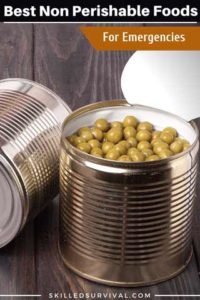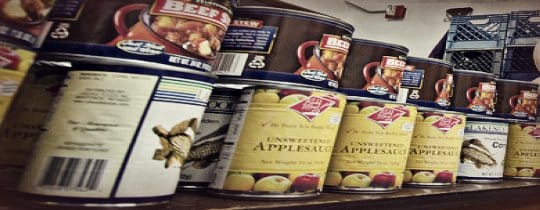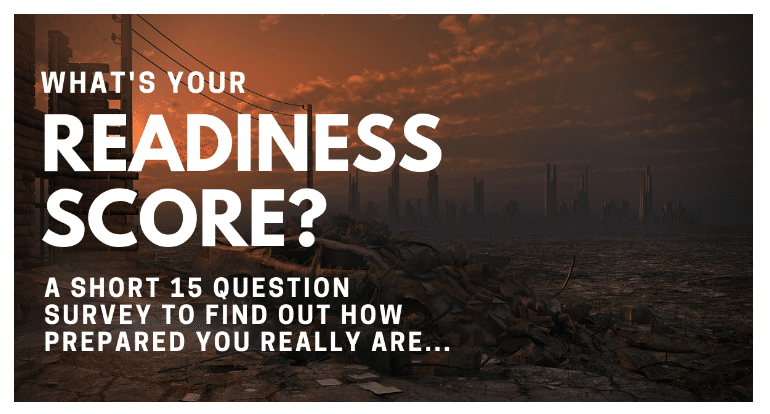
- Approximately 1/3 of worldwide human food production is wasted every year (about 1.3 BILLON tonnes)!
- Food losses and waste add up to about $990 billion globally.
- Fruits and vegetables have the highest rate of waste of any food type.
- Per person, waste by North American and European consumers is between 210 and 250 lbs per year!
- 842 MILLION people in the world do not have enough food…about 12% of the world’s population!
So by eliminating so much waste, we can help to reduce much of our world’s starvation.
Essentially – good food preservation practices can help to reduce this unnecessary waste. And one big component of food preservation is understanding the ins and outs of non-perishable food.
So today, let’s go over in detail the following topics:
TABLE OF CONTENTS
What Are Non-Perishable Foods
Why Choose Non-Perishable
List Of Non-Perishable Foods
Where to Buy Non-Perishable Foods
From Fresh To Non-Perishable
Best “How To” Preserve Resource
Healthy Non-Perishable Food
Non-Perishable Food For Hurricanes
Are You Ready For The Tough Times Ahead? Take My 60 Sec Quiz To See If You’re Part Of ‘The Fragile Masses’ Or Not… Start Quiz Now!
What Is Non-Pershiable Food Anyway?
Non-perishable foods are foods that:
Remain stable and safe to eat for long periods of time without refrigeration.
We all know different foods spoil at different rates.
Dairy products (such as milk and eggs) will spoil quickly if left out on the counter (unless you use powdered milk and eggs).
While a granola bar might last several weeks with no ill effects.
The point is:
There are extremes in food spoilage rates, and non-perishable items are on the far end of the spectrum. The further out, the less perishable it is.
Now, technically no food is truly non-perishable FOREVER. Eventually, all foods will become spoiled, rancid, or lose flavor.
Bacteria will eventually decompose all organic matter. It feeds off calories just as we do. It changes food’s taste, color, and smell and can create foodborne illnesses if ingested.
Sure, with the help of technology, food may last several decades. But don’t expect anything to last much longer than that.
↓ 20 Foods To Stockpile That NEVER Expire ↓
As A Way To Introduce You To Skilled Survival, We’re Giving Away Our Family First Food Planning Guide. Click Here To Get Your FREE Copy Of It.
Reasons Why You Should Buy Non-Perishable
Now that you know what non-perishable foods are, you may wonder, so what? We have refrigeration.
Yes, we do – most of the time.
Emergencies
But what happens when the power goes out for a few days or even a few weeks? Those frozen steaks, cartons of eggs, and your head of lettuce are in serious trouble.
And once those take a turn for the worst – you’ll be glad you kept some shelf-stable foods in your pantry.
Non-perishable foods are a staple within the broader category of survival food kits.
That’s why here at SkilledSurvival, we tend to focus on stockpiling food for emergencies and basic prepping.
↓ How To Start A Prepper Food Pantry ↓
But there are other reasons to invest in non-perishable foods:
Camping
Sometimes it’s worth buying some non-perishable food for a camping trip. Why? Because you can avoid dealing with a cooler and melting ice.
It seems like every time I take my cooler camping; we buy lunch meat and brats for our camping meals.
And the ham slices and brats start swimming every time the ice melts.
Creating a gross raw meat cesspool.
Instead, you can avoid this entire fiasco by taking a perishable meat choice – like Beef Jerky.
Travel
Sometimes, it’s easier to avoid the hassles of cooking altogether.
One example of this is if you backpacking or traveling. These foods prevent you from building a fire or taking a portable stove.
This can help save weight or space.
Plus, you are normally exhausted from backpacking by the end of the day. You want to set up camp, eat, relax, and go to bed.
So why not make the feasting process as simple and effortless as possible? It’s a chore to cook a meal when your energy is depleted and your tummy is rumbling.
For Donation
A food bank will ask specifically for “non-perishable food items.” They need foods they can stockpile, transport, and serve without worrying about refrigeration.
Can you imagine feeding thousands of homeless and starving people fresh salads? It would likely spoil before they could serve it…
One of the staples of food donation is canned foods – they are almost always a wise gift. But I encourage you not to give canned food that you’ve never eaten because it’s gross.
Donate tasty and healthy canned foods!
So avoid donating your cans of “Creamed Possum in Coon Healthy Fat Gravy Garnished with Sweet Potatoes” – Yuck!
List Of Non-Perishable Foods
No article about non-perishable foods would be complete without a list.
However, this list is not exhaustive:
- Beef Jerky
- Granola Bars
- Dried Pasta (ramen noodles, macaroni, spaghetti, etc.)
- Trail Mix (especially the nuts)
- Dry Rice and Beans (here’s our article on stockpiling rice)
- Canned Foods (meats, green beans, vegetables, fruits, soups) – (here’s our article on canned food expiration dates)
- Freeze-Dried Meals (here’s our article on freeze-dried foods)
- Oatmeal
- Nut Butter (here’s our article on powdered peanut butter)
- Apple Sauce
- Coffee Beans
- Pancake Mix
- Sugar
- Syrup
- Vegetable Oil
- Crackers (hardtack) – (here’s our article on How To Make Hardtack)
- MREs – (here’s our article on MREs)
- Pemmican – (here’s our article on How To Make Pemmican)
- Powdered Milk
- Dried Fruits (here’s our article on How To Dehydrate Fruit)
- Most Dry Spices
↓ Top Forever Foods For Survival ↓
As A Way To Introduce You To Skilled Survival, We’re Giving Away Our #78 Item Complete Prepper Checklist. Click Here To Get Your FREE Copy Of It.
Where To Buy Non-Perishable Foods
You can get many of these foods from your local grocery store.
Peanut butter, crackers, honey, etc., are all readily available to pull off the shelf. But one type of food that is more difficult to find at the grocer is Freeze Dried Foods.
Specialty manufacturers make these non-perishable foods. But you won’t find a wide selection of freeze-dried foods in your local grocery store.
They sell them mainly at sporting goods stores or online.
So why go out of your way to invest in freeze-dried foods? Because they ARE the best food for survival and preparedness!
But freeze-drying meals yourself is both time-consuming and cost-prohibitive.
So, we’ve got you covered if you want to stockpile a significant amount of freeze-dried food. We’ve put together several reviews for you to get started.
I’ve personally used all three brands for my emergency stockpile.
Each of these companies has its pros and cons, but they are all reputable. So do some comparison shopping and get yourself some freeze-dried food.
As A Way To Introduce You To Skilled Survival, We’re Giving Away Our Family First Food Planning Guide. Click Here To Get Your FREE Copy Of It.
How To Make Perishable Foods Non-Perishable
Making food non-perishable boils down to reducing bacteria’s ability to grow.
Bacteria is an organic entity; it’s alive. So just like you and me, it has basic survival needs (not all that different from ours).
Bacteria need the following to survive:
- Mild, Room Temperature Ranges
- Air (oxygen)
- Moisture (water)
- Food
Now – before we start blocking bacteria – we can’t block the last item on the list – Food. Why? Because food is what we are trying to protect.
Eliminating the food source defeats the purpose!
But if you block any of the other key ingredients, you can reduce bacteria’s evil plans to spoil your food.
Temperature Control
Most of us currently prevent food spoilage every day using refrigerators and freezers. Cold temperatures reduce bacteria’s ability to survive or thrive.
In freezing cold temps, it dies. In cooler temps, it can survive but is weaker and doesn’t thrive.
Side Note: There were root cellars and iceboxes before electricity and refrigeration. Not nearly as convenient, but the principles were the same. Lower temperatures preserve food longer.
Suffocation
Another way to combat food-spoiling bacteria is to remove oxygen.
Bacteria need oxygen to survive. So by using vacuum sealing, oxygen absorbers, and/or mylar bags, you can separate the food from oxygen.
Remove The Moisture
Finally, bacteria need water (i.e., moisture) to survive. If you remove most or all the moisture in food, bacteria will not spoil it.
However, as we’ll see shortly, there is a big difference between dehydrated foods (reduced moisture) and freeze-dried food (near zero moisture)…
So now let’s go over a few of the more conventional ways people reduce bacteria’s ability to spoil their foods.
Canning
Canning, especially your extra garden produce, is one time-tested way to preserve food.
Essentially, canning is putting veggies into sealable cans with liquid and then using heating and cooling to create a vacuum (i.e., no air).
Why? Because, just like us, bacteria need air to survive. So with no oxygen, bacteria cannot survive to destroy your canned foods.
Freeze Drying
Freeze-drying food is a process that removes nearly all the moisture from food. But does so in a way that doesn’t damage the food.
Remember, moisture is a key ingredient for bacterial growth. So by removing all moisture, you’re eliminating bacterial growth in the food.
Freeze-drying leaves the food in a state willing to accept and reconstitute moisture. Usually, you need to add liquids to the food and allow it to reabsorb moisture. With some meals, you add boiling water to reconstitute and cook the food.
However, freeze-drying on your own is either complex or expensive.
If you try to make your own freeze dryer – it will be a complicated engineering project. Yes, it CAN be done but at the cost of a lot of time and energy.
The other way to make your own freeze-dried food is to buy a home freeze-dryer.
Harvest Right is the leader in this home freeze-drying industry.
So, buying a Harvest Right freeze drier makes sense if:
- You have a lot of extra money to spend
- Or do you know a large group of people who want to share the expense and the machine
- Or you want to start your own small freeze-drying business
If you agree with any of those options, you SHOULD definitely check out Harvest Right Start by watching the video below:
↓ How Your Harvest Right Freeze Dryer Works ↓
For everyone else, I recommend buying freeze-dried foods instead.
You should check out Valley Food Storage, Legacy Emergency Foods, or Mountain House.
Why? Because you can buy a whole lot of prepackaged freeze-dried food for the several grand, it takes to own your own freeze-drier!
Dehydrating
Dehydrating food is somewhat similar to freeze-drying, but it’s not nearly as effective. Both reduce moisture but in vastly different ways.
Instead of using vacuum chambers and dried ice, you use heat and air movement to remove moisture.
The combination of heat and air dries out the food.
And again, lack of moisture is one proven strategy to halt or reduce the spoiling process.
As good as this sounds – dehydrating is not nearly as effective as freeze-drying.
Sure, you can turn a perishable apple into non-perishable apple chips.
It’s definitely better than nothing and will prevent bacterial growth. But dehydrated foods won’t last decades like freeze-drying.
Freeze Drying VS Dehydrating
One way to think about dehydrating vs. freeze-drying is to compare it to a Refrigerator vs. a Freezer.
A refrigerator slows bacterial growth but doesn’t completely eliminate it. A freezer eliminates bacterial growth. So dehydrating is a bit like refrigeration (slows the growth), while freeze-drying is more like a freezer (eliminates all growth).
But freeze drying is BETTER than freezers because it doesn’t need a constant flow of electricity!
So freeze-drying is preferred for extremely long shelf lives – it’s the ultimate survival and preparedness food.
Back to dehydrating – the good news is, dehydrating is both easy to do yourself and extremely affordable.
You can start dehydrating fruits and vegetables today using tools you already own.
All you need is one of the following:
- A conventional oven (low heat – crack the door open)
- A food dehydrator, or
- A DIY backyard dehydrator (using wind and sun)
↓ Dehydrating For Food Storage ↓
Excellent “How-To” Preserve Resource
I want to share with you one of the best non-perishable food resources I know of.
It’s a book full of old-school “lost” food preservation techniques.
It includes all the forgotten foods used before refrigeration!
It’s called “The Lost Ways.”
This book includes step-by-step instructions on all sorts of Lost Techniques, such as:
- How To Make Pemmican (a long shelf life meat invented by Indians)
- How To Build A Self-Feeding Fire
- Plus so much more…
If these “lost” frontier living techniques interest you (or someone you know) – click here to learn more.
It’s an excellent book to add to a survival library.
As A Way To Introduce You To Skilled Survival, We’re Giving Away Our #78 Item Complete Prepper Checklist. Click Here To Get Your FREE Copy Of It.
Healthy Non-Perishable Foods
Some foods are healthier than others.
For example, MRE (meals ready to eat) are NOT known for their health.
They’re packed with calories to give soldiers in the field plenty of energy. But if you’re eating MREs and not exercising much, don’t be surprised if you start packing on the pounds.
Soups also tend to have a lot of sodium – so try not to eat canned soup for every meal!
However, nuts (like Almonds) are very healthy for you. Beans are a healthy form of protein.
And while canned vegetables do not taste as fresh as garden veggies, they’re still healthy non-perishable food items.
They’re a necessary source of vitamins and minerals you can’t get from other foods.
So, keep your stockpile healthy by making wise food choices.
↓ Unhealthy Vs. Healthy Snack Foods – Mind Over Munch ↓
Non-Perishable Food For Hurricane Prep
People tend to ask us about non-perishable food related to hurricanes.
Why hurricanes and not other emergencies?
I think it’s because hurricanes are a disaster you usually see coming days ahead of time. So when a hurricane becomes a reality, people start researching their food options.
Other emergencies happen fast and unexpectantly – like tornados, earthquakes, wildfires, etc. You don’t the same amount of advanced notice for these disasters…
With that said, your food for hurricanes is no different than any other type of emergency situation.
Calories are calories when the grocery stores are out of commission.
But maybe you should add a few extra cans of spinach (like Popeye) if you need the extra strength to weather the storm.
Otherwise, any foods in the examples listed above will do for your hurricane prep list.
Just make sure you keep the non-perishable foods in a safe, secure location. If the hurricane destroys your house and your food is in your upstairs pantry – it’s gone!
So try to store your prepper food in a basement or as secure a location as possible.
Prepare, Adapt, and Overcome,
“Just In Case” Jack
P.s. Are you ready for the tough times ahead?
Find out now by taking my short Readiness Score Quiz – it’s absolutely free.
Once complete, you’ll know exactly where you stand on the “fragile” vs.” resilient” spectrum.
So click here to start the Quiz….And don’t worry; the questions are so easy a 3rd grader could answer them.
Click on the image to begin the Quiz and find out once and for all if you’re part of “The Fragile Masses” or “The Resilient Few.”
The post Best Non Perishable Foods To Thrive In Times Of Chaos appeared first on Skilled Survival.









